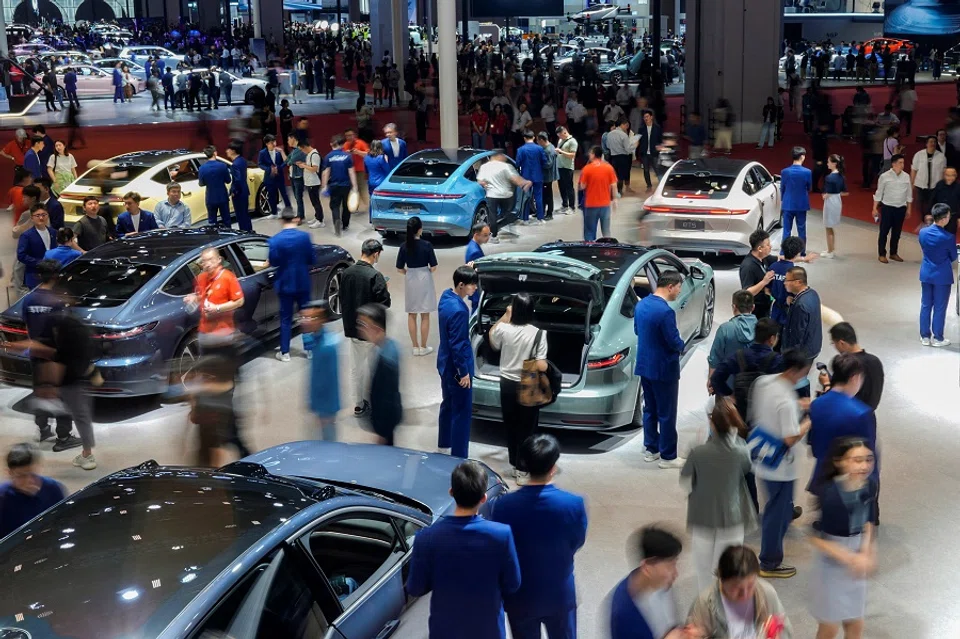Shanghai Auto Fair: Battle of the Chinese EV giants
Controversy over the 'ice cream incident' aside, the explosive popularity of the Shanghai Auto Show, along with the earlier Canton Fair, signals the "revenge recovery" of the expo economy.

When European Union Chamber of Commerce in China (EUCCC) president Joerg Wuttke asked the media at a press conference what they thought of this year's Shanghai Auto Show, their response was a unanimous "Ice cream!"
Car brand Mini, owned by German automaker BMW, has been embroiled in controversy since its staff was caught on camera handing free ice cream to a foreigner after refusing it to a Chinese visitor. Other exhibitors at the auto show reacted by promising free ice cream for all, but the organisers were quick to ban all exhibitors from offering free ice cream.
The ice cream affair was on Weibo's top search for days, effectively stealing the thunder from the world's first A-class auto show of the year at one point. But for automobile lovers, this was just a blip in a ten-day event with much more to offer.
Chinese EV giants the star of the show
On the opening day of the auto show, I was most impressed by how popular electric vehicles (EVs) were, and the rise of Chinese brands in that category. Chinese EV giant BYD's exhibition space was just opposite BMW's. There was a constant stream of visitors at BYD's booth, ranging from those wanting to test-drive the vehicles to others doing livestreams, and from Chinese car owners to foreign ones.
In contrast, the exhibition areas of Japanese, European and American car companies, especially those of traditional fuel cars, were somewhat quieter.

With an exhibition space twice as large this year, BYD set up three zones targeted at different consumer groups: one, small EVs priced at less than 80,000 RMB (roughly US$11,500); two, mid-sized electric sedans benchmarked against Tesla's; and three, the brand's first-ever high-end off-road sports utility vehicle (SUV) and supercars in the million-dollar range. The "Yangwang U8" SUV priced at nearly 1.1 million RMB apparently got over 10,000 pre-orders within two days.
Other Chinese EV brands such as Nio, Li Auto and XPeng also released new car models, attracting large crowds to their booths. In contrast, the exhibition areas of Japanese, European and American car companies, especially those of traditional fuel cars, were somewhat quieter. Consumers seemed to have "voted with their feet", pointing to the future direction of the development of China's auto market.
... there are now more than 94 EV brands offering over 300 models in China, making it the world's most vibrant EV market.

Statistics from market research companies show that there are now more than 94 EV brands offering over 300 models in China, making it the world's most vibrant EV market. Among all new cars sold in China last year, 25% of them were EVs or plug-in hybrids, with sales almost doubling in 2022. In comparison, the sales of fuel cars was down 13% year-on-year in 2022.
Despite weak demand in the global automotive industry, Nio CEO William Li Bin is optimistic that the share of EVs in the Chinese market could increase to more than 40% this year. At the auto show, BYD also ambitiously announced that it would increase its sales target by 66% to 3 million units this year.
International car makers strike back
Faced with the intense competition from Chinese automaker challengers, established car makers had a rejoinder. BMW, Mercedes-Benz, Audi and other German automakers had their CEOs personally attending the Shanghai Auto Show, unveiling their new products, while Volkswagen flew in its entire board of directors and hundreds of employees in a show of commitment to the Chinese market.

Japan's "Big Three" automakers Toyota, Honda, and Nissan also showcased their latest EV products and concept cars, with Honda announcing that it would stop selling gasoline-powered cars in China three years earlier than planned. As for Toyota, it is ramping up the pace of shifting the Chinese market towards EVs by devolving power - its China strategy will no longer require approval from its headquarters in Japan, and will instead be implemented by the Chinese R&D centre.
The sense of crisis felt among traditional automakers is not unfounded. According to data from the German Association of the Automotive Industry (Verband der Automobilindustrie, VDA), the market share of German cars in China fell from 24.6% in 2019 to 19.1% last year, even lower than the 19.9% in 2015. Japanese automakers also experienced a 10.3% year-on-year drop in sales in China last year, with a market share that fell by 2.7 percentage points to 19.9%.
An industry about 'fast fish eating slow fish'
The fierce competition between domestic and foreign automakers at the Shanghai Auto Show highlights the huge potential that the Chinese market still holds even after the three-year impact of the pandemic, and the rapidly evolving and growing nature of the market.
... the average age of Mercedes customers in Marseille is 53, while in China, it is only 35; the average age of Porsche customers in Germany is 52, while in China, it is less than 40, and predominantly female.

The ice cream incident that stole the limelight for a while reflects a shift in consumer attitudes towards foreign brands, from looking up to them, to seeing them at the same level. Also, the increasingly intense price wars will not only test Chinese automakers, but also drive the global automobile market. As BYD chairman Wang Chuanfu said, in the future, the industry may no longer be about "big fish eating small fish", but "fast fish eating slow fish".
At the EUCCC press conference, Wuttke also cited the automotive industry as an example of how the rapidly changing demands of Chinese consumers are driving European companies to change. He said that the average age of Mercedes customers in Marseille is 53, while in China, it is only 35; the average age of Porsche customers in Germany is 52, while in China, it is less than 40, and predominantly female.
"In Germany, if a father drives a Mercedes, his son will also drive a Mercedes. In China, if a consumer is dissatisfied with a car's performance, they will change it next year," said Wuttke. He added that Chinese consumers are younger, less brand-loyal, and their demands will become a key driving force for European companies' R&D and innovation.

As the first large-scale international expo following China's shift in Covid policy, the explosive popularity of the Shanghai Auto Show, along with the earlier Canton Fair, signals the "revenge recovery" of the expo economy, and raises expectations for the Import Expo to be held in Shanghai in the second half of the year. On the other hand, many who attended the auto show were reinfected with Covid, sparking concerns of a second wave of the pandemic.
As the global economic outlook weakens, attention is again on China as it emerges from the pandemic. How much will this huge market invigorate the world economy? What changes will it drive in various industries? Will it bring new risks? Like an ice cream drawing one's attention, the Shanghai Auto Show is making people more curious and excited about China this year.
This article was first published in Lianhe Zaobao as "除了冰淇淋,上海车展还有什么?".



![[Photos] Fact versus fiction: The portrayal of WWII anti-Japanese martyrs in Taiwan](https://cassette.sphdigital.com.sg/image/thinkchina/3494f8bd481870f7c65b881fd21a3fd733f573f23232376e39c532a2c7593cbc)

